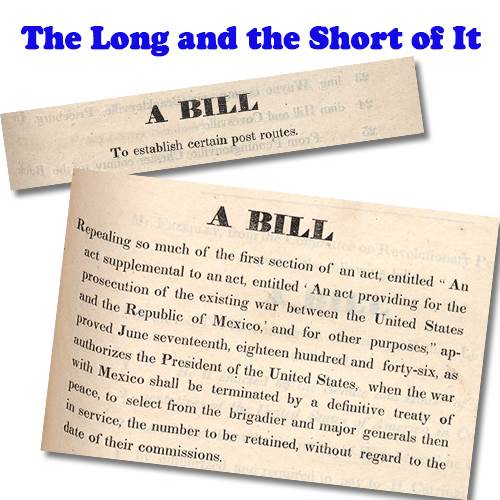By Daniel Worthington
As a member of the U. S. House of Representatives, Abraham Lincoln encountered hundreds of bills. Topics ranged from pensions for war veterans and their families, to reform of the franking privilege, to territorial governments for Minnesota and New Mexico. Titles varied in length and complexity, too.
There was the short and simple, like “A Bill to Establish the Territorial Government of Minnesota.”
Then there was the protracted and descriptive: “A Bill Granting Pensions to the Surviving Petty Officers, Seamen, and Marines, Who, under the Command of Captain Stephen Decatur Jr., Captured and Destroyed the Frigate Philadelphia in the Harbor of Tripoli, on the Night of February 16, 1804.”
Some were elongated and convoluted: “A Bill to Declare the True Intent and Meaning, so far as Respects the Franking Privilege of Members of Congress, of the Act Approved March 1, 1847, and Entitled ‘An Act to Amend the Act Entitled ‘An Act to Reduce the Rates of Postage, to Limit the Use and Correct the Abuse of the Franking Privilege, and for the Prevention of Frauds on the Post Office Department,’ Passed March 3, 1845."
Of all the topics considered by the Thirtieth Congress, the war with Mexico and subsequent peace received the most deliberation. Two of the shorter, more intelligible bill titles were “A Bill to Carry into Effect Certain Stipulations of the Treaty between the United States of America and the Republic of Mexico, of February 2, 1848,” and “A Bill for the Payment of Liquidated Claims against Mexico.”
 Two bills with vastly different titles
Two bills with vastly different titles
The war and its aftermath also begot two of the longer and more elaborate bill titles relative to actual bill text. Reported to the House on May 31, 1848, and running 736 words was this bill to provide pensions for families who lost fathers and sons in the war: “A Bill to Provide for the Families of Such Commissioned Officers, Non-commissioned Officers, Privates, and Musicians, Whether Belonging to the Regular Army or to Any Volunteer Corps, as May Have Been Killed in Battle, or Died from Wounds Received, or Diseases Contracted, or Other Casualties Occasioned Whilst in the Service of the United States, during the War with the Republic of Mexico, and for Other Purposes.”
And this bill, introduced on February 29, 1848, whose title, at eighty-nine words, almost equals the length of the bill text (105 words): “A Bill Repealing so much of the First Section of an Act Entitled ‘An Act Supplemental to an Act Entitled ‘An Act Providing for the Prosecution of the Existing War between the United States and the Republic of Mexico,’ Approved June 17, 1846, as Authorizes the President of the United States, When the War with Mexico Shall Be Terminated by a Definite Treaty of Peace, to Select from the Brigadier and Major Generals Then in Service the Number to be Retained, Without Regard to the Date of Their Commissions.”
Abraham Lincoln did not have a hand in titling and writing these bills but, as a member of the House Committee on Post Offices and Post Roads, he did help author one of the longest bills passed by the Thirtieth Congress. Enacted into law on August 14, 1848, the innocuously titled “A Bill to establish certain Post Routes” ran to 6,408 words in its final form, covering fifteen pages in volume 9 of The United States Statutes at Large (1845-1851).
For more bills encountered by Lincoln during his time in the House of Representatives, explore The Papers of Abraham Lincoln Digital Library
Dr. Worthington is director of the ALPLM's Papers of Abraham Lincoln.
# # #